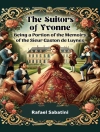The Waverly Collection, a seminal work by Sir Walter Scott, represents a pivotal moment in the evolution of the historical novel, intertwining the complexities of Scottish history with rich, evocative prose. This collection comprises several narratives that explore themes of loyalty, identity, and the tensions between tradition and modernity, all while employing a narrative style that combines romanticism with realism. Scott’s meticulous attention to historical detail and his vivid characterizations breathe life into a Scotland grappling with shifting sociopolitical landscapes, making it an essential text for understanding the period’s literary innovations. Walter Scott, often regarded as the father of the historical novel, was profoundly influenced by his Scottish heritage and the turbulent history that shaped it. His experiences growing up amidst the remnants of Scotland’s feudal past and his profound interest in folklore, language, and cultural identity shaped his narrative vision. The complexity of societal changes and national pride are intrinsic to his writing, reflecting his desire to reconnect readers with their roots through compelling storytelling. The Waverly Collection is highly recommended for readers seeking a deeper understanding of Scottish history and literature’s role in shaping national identity. Scott’s masterful storytelling invites readers to traverse a world where myth and history converge, ensuring a read that is as enlightening as it is entertaining.
A propos de l’auteur
Sir Walter Scott, 1st Baronet (1771 – 1832), was a towering figure in the realm of English literature and is celebrated for his significant contribution as a historical novelist and poet. Born in Edinburgh, Scott was a prolific writer whose works profoundly influenced the literature of the 19th century. Notably, his assemblage of historical novels, known as ‘The Waverley Novels’, played a pivotal role in shaping the genre, earning him the distinction of the ‘Great Unknown’ and later revealing him as their author. Beginning with ‘Waverley’ in 1814, which gives its name to the series, Scott painted vivid pictures of the Scottish landscape and history, weaving together fact and fiction in a truly innovative fashion. His other notable titles within this collection include ‘Ivanhoe’, which provided a romanticized vision of Medieval England, and ‘Rob Roy’, which delved into the adventures of its eponymous Scottish hero. Scott’s literary style often combined a rich narrative with detailed historical settings, making the past accessible and entertaining for his readers. He was a master storyteller who could blend chivalric romance, political intrigue, and social commentary. His influence is apparent in the works of later writers and in the Romantic movement in literature. Beyond his novels, Scott was also acclaimed for his poetry, with works like ‘The Lady of the Lake’ contributing to his early reputation. Knighted in 1820 for his literary contributions, Scott’s enduring legacy is of a writer who brought the Scottish Highlands and the history of his nation to life through his literary genius.












